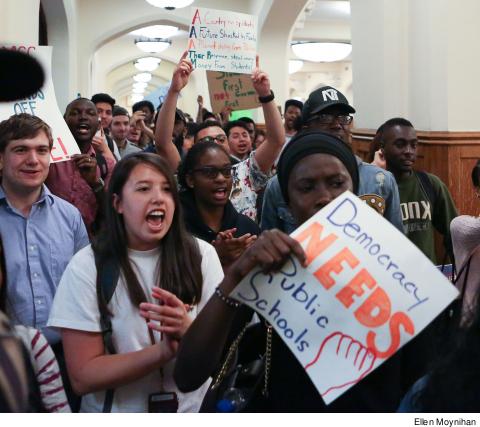 |
When you fight back, you can get results. CUNY students learned this powerful lesson in May after a university-wide coalition of students, with support from the PSC, forced the CUNY Board of Trustees (BOT) to postpone a vote on controversial changes to student activity fees, changes that would have compromised the independence of student media and gutted funding for certain student groups.
“Tonight was a good example of what student organizing can do. Student power is real,” Smitha Varghese told a crowd of students gathered together on May 9 to protest the fee changes. Varghese is a Queens College junior and the chair of the board of directors for the New York Public Interest Research Group (NYPIRG), a student group that is specifically targeted by the proposed changes to the students’ fees. “Keep up the momentum. We need to continue organizing,” she said.
STUDENT PRESSURE
The board’s postponement of student activity fee changes was the direct result of student activism. Students sat in on committee meetings tasked with drafting the changes, dozens spoke out at BOT hearings and students examined and protested the legal basis for the changes. Student activists also secured the support of several elected officials, as well as the PSC.
“This hasn’t been defeated. This is a cat with many lives,” PSC legislative representative Mike Fabricant told Clarion. “Larger numbers of students and a more multifaceted kind of pressure will be needed in order to squash it.”
The day the board announced the fee-change postponement, more than 100 students attended a rally with several City Council members present. In a royal blue suit pinned with a “Stay Woke” button, City Councilman and Brooklyn College alumnus Jumaane Williams addressed the crowd of students, who had assembled before the BOT meeting.
“We are not going to stand by, we are not going to be quiet while you’re taking away the power of students,” Williams said at the rally, specifically calling out the Board of Trustees and Governor Andrew Cuomo. Williams is also running for lieutenant governor.
Students protested for months over the proposed changes that they said would limit political speech on campus and, specifically, end the funding stream for NYPIRG. The changes seemed like a done deal, and they were expected to be formalized in late June despite student protest. Students who had sat in on various committee meetings released a statement about their “collective disappointment” when they allegedly heard CUNY General Counsel Loretta Martinez specifically say that Governor Andrew Cuomo had an interest in defunding student advocacy groups. (See “Board proposal diminishes student control over fees,” in the May issue of Clarion.)
‘BEST PRACTICES’
CUNY’s proposal to revise its bylaws regarding student activity fees came as the result of a recent legal settlement at Queens College and, says the BOT, the need to bring university policies in line with “best practices.” But those organizing around the issue said the proposed changes did not seem to be legally mandated, as the university claims.
Hunter College senior John Aderounmu, who is the student representative on the CUNY BOT, submitted a letter to former Attorney General Eric Schneiderman’s office, the office which had represented the board in the recent QC case. The letter asked for the office’s legal opinion regarding the recent legal settlement, and the legal basis for the elimination of student referenda funding for certain groups and the ending of of allocations for activity fees to organizations, such as NYPIRG, incorporated outside of CUNY.
The State Attorney General’s Office intervened. In a May 1 letter to the CUNY BOT, Deputy Attorney General Kent Stauffer wrote that the recent settlement was only binding to Queens College. The office “did not draft” nor “review” the proposed changes, and the scope of the lawsuit and the settlement did not deal with funding to external organizations, the letter stated.
“To the extent that CUNY’s Board chooses, in its own fiduciary capacity, to amend … bylaws governing the manner in which such organizations are funded, it does so at its own discretion, rather than at the behest of OAG in response to the [QC] settlement,” wrote Stauffer.
The letter came a week before the scheduled Board meeting when the CUNY BOT postponed their plans to change the bylaws.
“We are not voting to change the bylaws today. Any vote will include extensive input from all relevant constituencies,” BOT Chair William Thompson told those who were assembled in City College’s Great Hall. “For all of the students of CUNY, we hear you. We appreciate your voices and urge you to continue to speak out.”
ORGANIZING CONTINUES
But in a rally after the meeting, students expressed that their fight wasn’t over. Students assembled outside after the announcement.
Hercules Reid, University Student Senate legislative director, told students to pay attention to the word “postpone,” noting that the board was planning to take up the proposals in the Fall semester, and that students should prepare for the battle ahead.
“This is a victory for now,” Reid said, “but not forever.”

